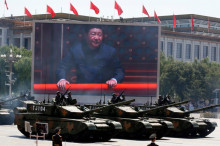For most of the post-World War II era, Americans have worried about the ideology of those who opposed us. It was “Communist ideology” that we feared. After the Soviet Union imploded and China – a Communist country – began to rise, it was easy, and even natural, to assume that America is now facing a new “Communist ideology” that must be dealt with.
That is why I found Edward Wong’s piece, “A Chinese Empire Reborn,” so valuable. The author reveals that we must understand that China isn’t about ideology, it’s about power. He says:
From trade to the internet, from higher education to Hollywood, China is shaping the world in ways that people have only begun to grasp. Yet the emerging imperium is more a result of the Communist Party’s exercise of hard power, including economic coercion, than the product of a gravitational pull of Chinese ideas or contemporary culture.
Of the global powers that dominated the 19th century, China alone is a rejuvenated empire. The Communist Party commands a vast territory that the ethnic-Manchu rulers of the Qing dynasty cobbled together through war and diplomacy. And the dominion could grow: China is using its military to test potential control of disputed borderlands from the South China Sea to the Himalayas, while firing up nationalism at home. Once again, states around the world pay homage to the court, as in 2015 during a huge military parade.
For decades, the United States was a global beacon for those who embraced certain values — the rule of law, free speech, clean government and human rights. Even if policy often fell short of those stated ideals, American “soft power” remained as potent as its armed forces. In the post-Soviet era, political figures and scholars regarded that American way of amassing power through attraction as a central element of forging a modern empire.
China’s rise is a blunt counterpoint. From 2009 onward, Chinese power in domestic and international realms has become synonymous with brute strength, bribery and browbeating — and the Communist Party’s empire is getting stronger.
At home, the party has imprisoned rights lawyers, strangled the internet, compelled companies and universities to install party cells, and planned for a potentially Orwellian “social credit” system. Abroad, it is building military installations on disputed Pacific reefs and infiltrating cybernetworks. It pushes the “One Belt, One Road” infrastructure initiative across Eurasia, which will have benefits for other nations but will also allow China to pressure them to do business with Chinese state-owned enterprises, as it has done in recent years throughout Asia and Africa.
Chinese citizens and the world would benefit if China turns out to be an empire whose power is based as much on ideas, values and culture as on military and economic might. It was more enlightened under its most glorious dynasties. But for now, the Communist Party embraces hard power and coercion, and this could well be what replaces the fading liberal hegemony of the United States on the global stage. It will not lead to a grand vision of world order. Instead, before us looms a void.
Want to read more.


